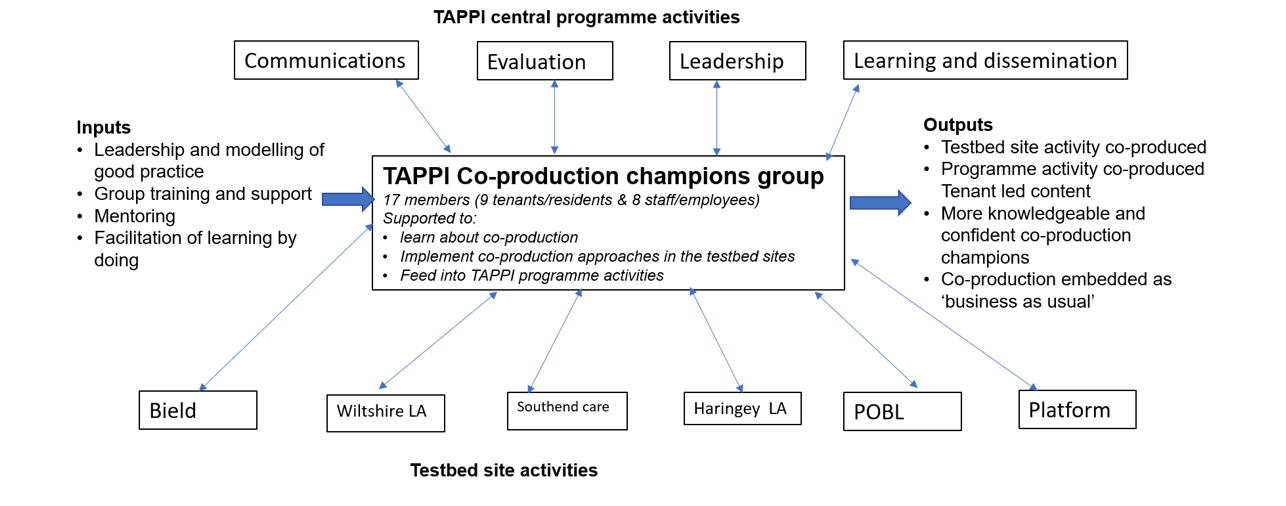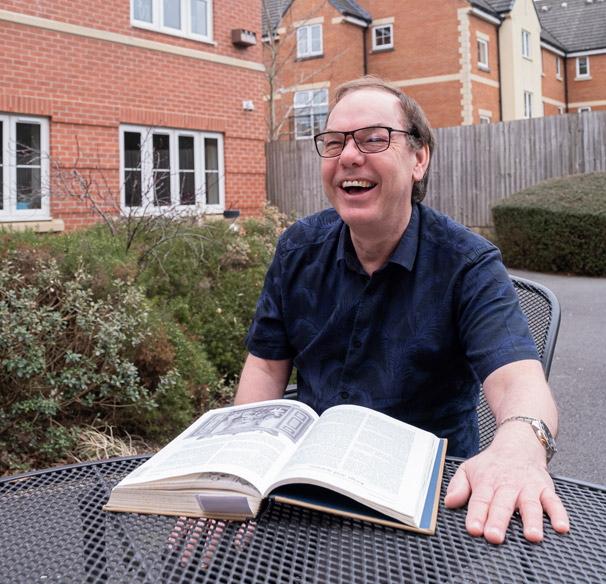Co-production in TAPPI
Supported by our Co-Production and Engagement Partner Co-production Works (opens new window) and our Co-production Champions’ Group co-production was at the core of the second phase of TAPPI.
These pages provide a summary of the co-production aspect of TAPPI.
Co-production in TAPPI diagram

Co-production challenges
TAPPI is a complex project and implementing co-production was challenging. The main factors which made co-production in TAPPI especially challenging were as follows.
The client group
The first set of challenges are due to the nature of the client group. Later life housing tenants are likely to have significant access issues and barriers to their participation.
The topic
Co-production works best when there are as few restrictions on what people can talk about as possible. So the focus on assistive technology had to be sensitively managed. Some participants wanted to talk about other issues such as the accessibility and quality of their housing generally. Some issues that tenants raised did not have digital solutions. It required sensitive facilitation to acknowledge the importance and legitimacy of these issues but also to steer the conversation back toward assistive technology.
The topic of technology itself also presented a barrier as there was quite low digital literacy among some tenants and others were suspicious or frightened of technology.
I’m a pen and paper person.

Complexity of the programme
The TAPPI programme ran across three nations and six testbed sites. In addition, the central support to the testbed sites was provided by four organisations: Housing LIN, Cambridge Centre for Housing & Planning Research at Cambridge University, TSA and Co-production Works. All the sites were part of large organisations. The housing and support in the sites was provided by several organisations. Some sites also had technology partners.
Timescales
The project ran for 18 months which was relatively short time for a project of TAPPI’s size and complexity.
Choosing a co-production approach
We chose a Champions model for two reasons. Firstly, Dunhill Medical Trust who funded the project wanted co-production to be embedded into the testbed sites. They wanted co-production to have a lasting impact and continue after the programme ended. Secondly, we did not have the capacity or level of funding which would have enabled us to provide the intensive support necessary to develop co-production in each site. These two factors led us to develop a Champions model.
We hoped that providing an overall framework, plus training, and support focussed on a central champions group would provide effective co-production for the TAPPI programme and leave a legacy of understanding, skills and experience.
The TAPPI approach
The approach had the following four components:
- Developing a framework
- Training
- Champion’s group meetings
- Mentoring and support
- Site visits

The project was completed in three phases, which can be explored in details under the links below:
Phase one: Development: July 2022 - December 2022
- Developing a framework
- Training
- Developing the co-production offer
- Recruiting the Champions’ Group
- Initial site visits
Phase two: Implementation: January 2023 – July 2023
- Running the co-production group
- Mentoring
- Continuing site visits
Phase three: Product Creation: August 2023 – December 2023
- Developing and testing products
- Champions group continues to meet
- Mentoring continues
- Final site visits
Other methods deployed
Supported by the Cambridge Centre for Housing and Planning Research (CCHPR), we conducted:
- Interviews with testbed management staff: Interviews were carried out with management staff at an early stage in the TAPPI2 project, and were then repeated later to gauge how understandings of the TAPPI principles had evolved over the course of the project, and to capture the practical lessons learned from implementing the principles across the six testbed sites.
- Surveys for residents/tenants: Two rounds of an online survey were circulated to each of the testbed sites. This survey aimed to capture baseline information on residents’ health, wellbeing, and attitudes to technology.
- Interviews with residents/tenants: CCHPR researchers visited each of the testbeds twice to carry out semi-structured interviews with residents. These interviews were focused on various issues, including residents’ views on technology, to what extent technologies met their needs and aspirations, and how included residents have felt in decision-making about the technologies they are using. The second research visit to each of the testbeds was used to gauge how residents’ thoughts on the technologies they are using have changed over time.
- Interviews with TAPPI Partners: In order to maximise the capture of learning from across the second Phase of the TAPPI programme, CCHPR researchers also conducted interviews with other project partners, including representatives from the co-production team and the TSA. These conversations provided additional insights into key aspects of the TAPPI2 programme, particularly as the partners interviewed had some oversight across the six testbeds.
As part of the Evaluation and Shared Learning Partner role, CCHPR also provided support to testbeds in developing their own capacity for evaluation. This involved:
- Conversations with testbed staff at the outset of the TAPPI2 programme, and periodically throughout the process, where we encouraged them to get in touch with any questions they had about their own evaluations.
- An evaluation workshop, breaking down the process of evaluation into key stages, and setting out important considerations which the testbeds might want to take into account.
- The survey which was distributed to all the testbeds, which they could use for their evaluations, and which also fed into the overall evaluation.
- A second evaluation workshop, to share evaluation findings and also to encourage shared learning among the testbeds.
- A standalone evaluation toolkit, drawing from several useful sources of information around how to conduct an evaluation of technology projects in housing and care settings.
